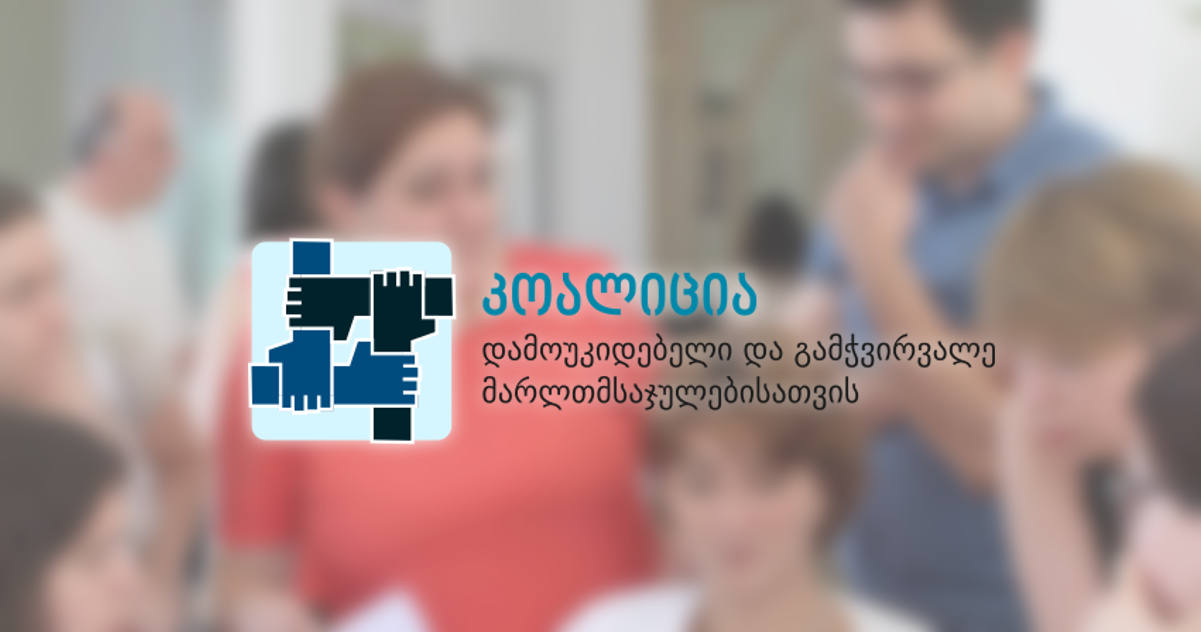


The Coalition for Independent and Transparent Judiciary gives a negative assessment to the legislative package drafted by the Ministry of Internal Affairs which provides for making amendments to the Code of Administrative Offenses. The initiated draft law considerably increases the amounts of fines for disorderly conduct – from GEL 100 to GEL 500-1,000, and for non-compliance with a lawful demand of a police officer or any other unlawful act against him/her – from GEL 250-2,000 to GEL 1,000-4,000. According to the explanatory note of the draft law, the amendments are aimed to increase the level of obedience to law in the population. It is noteworthy that achieving public order and obedience to law only by toughening legislation and repression is a wrong approach from the very outset, and is also ineffective in the long run. What is important for the prevention of offenses is uniform and fair enforcement of the law in all cases rather than toughening of punishment.
In a situation when the country has a Soviet-era Code of Administrative Offenses that does not include appropriate procedural safeguards, tougher sanctions are going to further intensify unsubstantiated restriction of constitutionally guaranteed human rights.
The Code of Administrative Offenses that is in force today fails to meet the requirements of fair trial and is often used to unlawfully restrict the right to peaceful assembly and expression. As a rule, participants of peaceful protests are detained under the aforementioned articles. Individuals “accused of” infractions such as disorderly conduct and non-compliance with a lawful demand of a police officer are unable to avail themselves of even minimum procedural safeguards. The courts do not exercise control over the lawfulness of administrative detentions, and the standard of substantiation of court decisions beyond a reasonable doubt does not apply. Thus, courts often take decisions only on the basis of explanations of law enforcement officers. Tight time frames of examination of cases and application of sanctions fail to ensure effective representation (examination of cases often last for 10-15 minutes).
The authorities themselves also talk about the lack of procedural safeguards and the necessity of reform. It was with this aim that on November 3, 2014, the Government of Georgia set up the Governmental Commission on the Revision of the Code of Administrative Offenses, which completed its work in 2014 and developed a draft of the new Code of Administrative Offenses. However, the draft Code has yet to be initiated in the Parliament.
Considering the aforementioned circumstances, we believe that the only correct change of the Code of Administrative Offenses will be its systemic revision. Accordingly, the retention of the Code in the existing form prolongs gross violations of fundamental human rights and of Georgia’s international obligations. And in the existing situation, considerable increases in the amounts of fines are going to have a chilling effect on unhindered realization of freedom of assembly and expression.
Therefore, we call upon:
- The Parliament of Georgia
Not to support the draft law prepared by the Ministry of Internal Affairs and not to toughen sanctions for administrative infractions;
- The Government of Georgia
To initiate the draft Code of Administrative Offenses in the Parliament of Georgia in a timely manner.
[1] https://info.parliament.ge/#law-drafting/15197; [f2]
ჯ. კახიძის #15, თბილისი, საქართველო, 0102 ; ტელ: (995 32) 95 23 53; ფაქსი: (995 32) 92 32 11; ელ-ფოსტა: gyla@gyla.ge; www.gyla.ge
15, J. Kakhidze str. 0102, Tbilisi, Georgia. Tel: (995 32) 95 23 53; Fax: (995 32) 92 32 11; E-mail: gyla@gyla.ge; www.gyla.ge